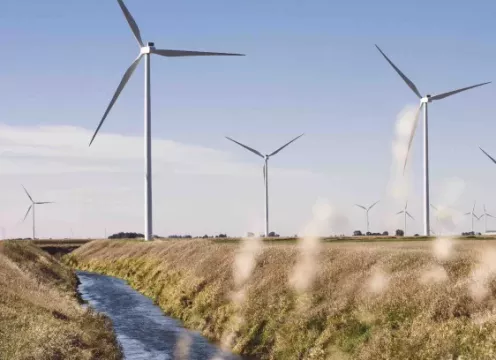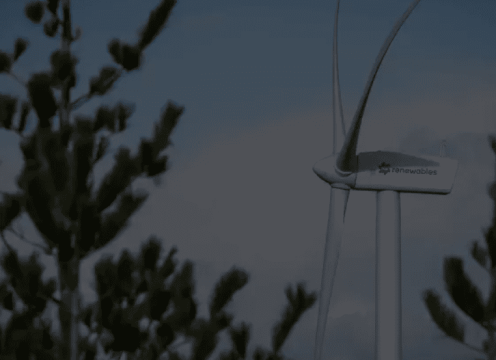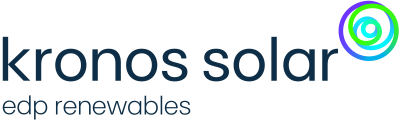Environmental Dimension
In EDPR we commit to
By producing clean and green energy, hat contributes to the reduction of GHG emissions.
In EDPR we commit to
By having a culture of rational use of resources.
In EDPR we commit to
By minimizing losses in biodiversity throughout our sustainable operations.
Environmental management life cycle approach
1. Materials and components
- Life cycle assessments revealed that most of the potential environmental impacts of wind farms and solar plants are concentrated in the raw materials extraction and components manufacturing stages, in which EDPR does not participate.
- Even though EDPR is not directly involved in the upstream processes, it is committed to promote sustainable practices in the supply chain, according to EDP Group’s Sustainable Procurement Policy.
- In addition, as stated in our Environmental Policy, EDPR commits to extend the management and improvement of environmental performance throughout the value chain.
2. Construction and installation
- A thorough process based on our in-house expertise ensures the location of EDPR facilities in the best sites, assuring top-class construction standards and respect for the environment and local communities.
- The construction and installation works are concentrated in a short period of time, and the process is closely followed by our qualified teams, who work to minimise potential impacts or disturbances and to ensure proper restoration of the land.
- In most cases, wind turbines and access roads occupy less than one percent of the land in the entire project area and the remaining land is still available for traditional activities.
3. Operation stage
- The operational stage is the core of our business. As an owner and operator, EDPR is committed to maintaining long-term operations of our projects for the benefit of our stakeholders while always keeping our environmental impact to a minimum.
- The proper management of the environmental aspects during operation is achieved through the Health and Safety and Environmental Management System (HSEMS), developed in accordance with the ISO 14001:2015 and ISO 45001:2018 international standards.
- The operating phase can be extended beyond the useful life by repowering the wind farms and solar plants (replacing old equipment by new one with greater capacity and performance), therefore producing clean energy for a few years more.
4. End of useful life
- At the end of their useful life, wind turbines are dismantled to return the environment to its original state. From the environmental point of view there are two main aspects to consider: land restoration and proper treatment of the waste generated.
- Even though EDPR works to minimise any impact on the land surrounding its facilities, the Company commits to clean up and rehabilitate the sites to return the area to its initial state.
- Properly managing turbines is crucial to maximize the impacts of wind energy. Recycling turbines avoids impacts associated to extracting raw materials, providing significant environmental benefits and contributing to a circular economy.

Health & Safety and Environmental Management System
The health, safety and well-being of our employees, as well as the protection of the environment, are a priority for EDPR.
These commitments are firmly set in the Health and Safety Policy and Environmental Policy and have been backed by the certification of both management systems for over 10 years.
Following the reference provided by the international standards ISO 14001:2015 and ISO 45001:2018, EDPR merged the Environmental Management System with the H&S Management Systems for a more global and efficient approach, simplifying processes and managing the potential risks of its activity. In 2020, the new Health, Safety and Environment Management System (HSEMS), where synergies play a fundamental role, was implemented and jointly certified by an independent certifying organization.
These commitments are firmly set in the Health and Safety Policy and Environmental Policy and have been backed by the certification of both management systems for over 10 years.
Following the reference provided by the international standards ISO 14001:2015 and ISO 45001:2018, EDPR merged the Environmental Management System with the H&S Management Systems for a more global and efficient approach, simplifying processes and managing the potential risks of its activity. In 2020, the new Health, Safety and Environment Management System (HSEMS), where synergies play a fundamental role, was implemented and jointly certified by an independent certifying organization.

Suppliers
EDPR’s market leadership, based in value creation capacity, innovation and relationship with its stakeholders, is much influenced by the performance of its suppliers.
Technical excellence together with sustainability is the basis of EDPR relationship with suppliers. This results in close collaboration, joint capacity to innovate, strengthen the sustainability practices and improve the quality of the Company’s operations.
EDPR has defined policies and procedures to ensure the several aspects that fill in with the sustainability, as well as the management and mitigation of any type of environmental, social or ethical risks in the supply chain.
The Suppliers Sustainability Guides provides an overview of the sustainability requirements EDPR expects its suppliers to meet.
Technical excellence together with sustainability is the basis of EDPR relationship with suppliers. This results in close collaboration, joint capacity to innovate, strengthen the sustainability practices and improve the quality of the Company’s operations.
EDPR has defined policies and procedures to ensure the several aspects that fill in with the sustainability, as well as the management and mitigation of any type of environmental, social or ethical risks in the supply chain.
The Suppliers Sustainability Guides provides an overview of the sustainability requirements EDPR expects its suppliers to meet.
